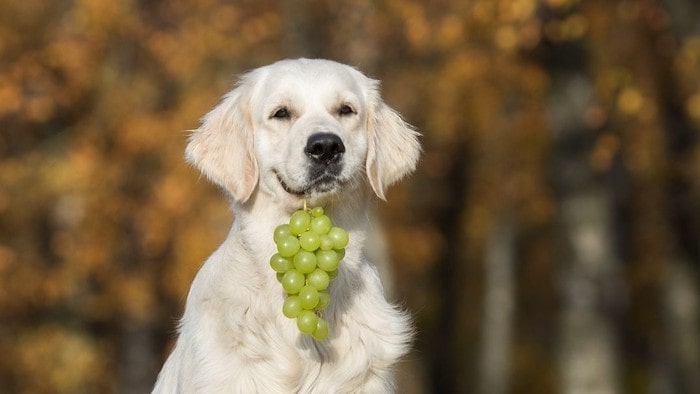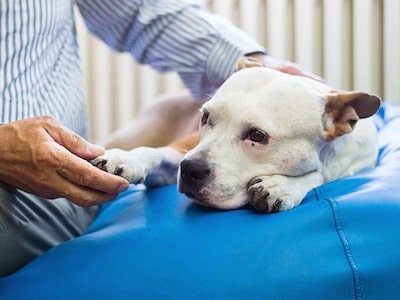As pet owners, we all want the best for our furry companions. We carefully select their food, provide them with the most comfortable beds, and shower them with endless affection. Yet, in our efforts to show them love and care, we may sometimes unknowingly expose them to potential dangers. One such hazard that has been a topic of concern among dog owners is the consumption of grapes.
In this article, we delve deep into the question, “Can dogs eat grapes?” We aim to equip you, as a responsible dog owner, with vital information to make informed decisions about what you offer your furry companion. We’ll explore the potential dangers of grapes for dogs, the signs and symptoms of grape toxicity, and what to do if your dog accidentally consumes grapes. By the end, you’ll have a clearer understanding of why it’s crucial to keep grapes far away from your canine companion’s reach.
So, let’s unravel the mystery behind the grapes and dogs debate and ensure the well-being of our four-legged friends by being aware and informed about this potential hazard. Together, we can create a safer and healthier environment for our beloved pets.
Why You Should Avoid Giving Grapes to Your Dog
Grapes are one of the most common fruits consumed by humans, and they are often used as ingredients in various foods and drinks, such as cakes, pies, jams, juices, and wines. However, what is tasty and nutritious for us can be deadly for our canine companions.

Grapes contain a toxin that can cause acute kidney injury (AKI) in dogs. AKI is the sudden loss of kidney function due to damage to the kidney cells. The kidneys are vital organs that filter waste products and toxins from the blood, regulate fluid and electrolyte balance, and produce hormones that control blood pressure and red blood cell production. When the kidneys fail, these functions are impaired, resulting in a buildup of waste products and toxins in the blood, dehydration, electrolyte imbalance, anemia, and high blood pressure.
The severity of AKI depends on how much of the toxin the dog has ingested and how quickly it is treated. Some dogs may recover with prompt veterinary care, while others may develop chronic kidney disease (CKD) or die from kidney failure.
The Mystery of Grape Toxicity: What Makes Grapes Harmful to Dogs?
The exact toxic substance and mechanism of grape toxicity in dogs are still unknown. Researchers have speculated that it could be related to tannins, flavonoids, monosaccharides, pesticides, fungicides, or mycotoxins (toxins produced by fungi) present in grapes. However, none of these substances have been conclusively identified or proven to cause AKI in dogs.
Another mystery is why some dogs can eat grapes or raisins without any adverse effects, while others develop AKI after ingesting even a small amount. There is no clear dose-response relationship between the amount of grapes or raisins eaten and the severity of AKI. Some dogs may develop AKI after eating as few as four or five grapes or raisins, while others may tolerate larger amounts without any signs of toxicity.

There may be individual factors that influence the susceptibility of dogs to grape toxicity, such as genetic predisposition, underlying health conditions, age, body weight, or metabolism. However, these factors have not been well-studied or established.
Therefore, it is best to assume that any amount or type of grape or raisin is potentially toxic to any dog and avoid giving them to your dog altogether.
Symptoms and Treatment of Grape Poisoning in Dogs
The symptoms of grape poisoning in dogs may vary depending on the amount ingested, the time elapsed since ingestion, and the individual dog’s response. However, some common signs include:
- Vomiting
- Diarrhea
- Loss of appetite
- Abdominal pain
- Lethargy
- Weakness
- Dehydration
- Increased thirst
- Excessive urination
- Reduced or absent urination
- Mouth ulcers
- Bad breath
- Coma
- Seizures
These symptoms may develop within 6 to 12 hours of eating grapes. However, some dogs may not show any signs until later. Therefore, it is important to monitor your dog closely if you suspect or know that they have eaten grapes or raisins.
If your dog has eaten grapes or raisins, you should contact your veterinarian immediately. This is an emergency situation that requires urgent medical attention. Do not wait for symptoms to appear or worsen before seeking help.

Your veterinarian may advise you to induce vomiting at home if your dog has eaten grapes or raisins within the last few hours. This may help remove some of the toxin from your dog’s stomach before it is absorbed into the bloodstream.
However, you should never attempt to induce vomiting without consulting your veterinarian first. Some dogs may have contraindications for vomiting induction (such as aspiration risk) or may have already vomited enough.
Your veterinarian may also recommend giving your dog activated charcoal. This is a substance that binds to toxins in the gastrointestinal tract and prevents them from being absorbed into the bloodstream. Activated charcoal may help reduce the amount of toxin that reaches the kidneys and cause damage.
The main treatment for grape poisoning in dogs is intravenous fluid therapy. This involves giving your dog fluids through a vein to flush out the toxins from the kidneys, maintain hydration and electrolyte balance, and support kidney function. Fluid therapy may be given for 24 to 48 hours or longer, depending on the severity of AKI and the response to treatment.
Your veterinarian may also prescribe other medications or treatments to manage the symptoms and complications of grape poisoning, such as anti-nausea drugs, painkillers, antibiotics, blood transfusions, or dialysis.
The prognosis for dogs with grape poisoning depends on several factors, such as the amount ingested, the time to treatment, the severity of AKI, and the presence of other health problems. Some dogs may recover fully with prompt and aggressive treatment, while others may develop CKD or die from kidney failure.
How to Prevent Your Dog from Eating Grapes and Other Toxic Foods
The best way to prevent your dog from eating grapes and other toxic foods is to keep them out of your dog’s reach and sight. Here are some tips to help you do that:
- Store grapes and raisins (and foods that contain them) in high cabinets or containers that your dog cannot access or open.
- Check the ingredients of any food or drink that you give to your dog or share with them. Avoid anything that contains grapes, raisins, currants, or sultanas.
- Do not leave grapes or raisins (or foods that contain them) on the counter, table, floor, or anywhere else where your dog can find them.

- Do not feed your dog any human food without checking if it is safe for them first. Some other foods that are toxic to dogs include chocolate, onions, garlic, macadamia nuts, xylitol (a sugar substitute), alcohol, caffeine, and avocado.
- Educate your family members and guests about the dangers of grapes and other toxic foods for dogs. Do not let them feed your dog anything without your permission.
- If you have a garden or an outdoor space where grapes or raisins may grow or be present, fence it off or supervise your dog when they are outside. Remove any fallen grapes or raisins from the ground.
- If you suspect that your dog has eaten grapes or raisins (or any other toxic food), contact your veterinarian immediately. Do not wait for symptoms to appear or worsen before seeking help.
FAQs
No, dogs should not eat grapes in any amount. Grapes, as well as raisins, can be toxic to dogs even in small quantities. It’s best to completely avoid giving grapes to your canine companion.
No, the sensitivity to grapes can vary between individual dogs and different breeds. Some dogs may show signs of toxicity after eating a small amount, while others may consume larger quantities without any apparent issues. However, it’s essential to remember that no dog is completely safe from the risks.
Yes, besides grapes, some other fruits like raisins, currants, and even certain citrus fruits can also pose a risk to dogs. Always consult with your veterinarian before sharing any new foods with your furry friend.
Unfortunately, there is no specific antidote for grape poisoning in dogs. The treatment primarily involves supportive care, such as inducing vomiting, administering activated charcoal to prevent further absorption of toxins, and providing intravenous fluids to maintain hydration.
Conclusion
In conclusion, it’s essential for dog owners to be aware of the potential dangers associated with grapes. The toxicity of grapes to dogs is well-documented, and even a small amount can have severe consequences, including kidney failure.
As responsible pet owners, our primary responsibility is to keep our furry friends safe and healthy. Therefore, the best course of action is to avoid giving grapes or any grape products to dogs altogether. Instead, opt for safe and dog-friendly treats to reward your canine companion.
By staying informed and taking preventive measures, we can ensure a happy and healthy life for our beloved pets.

Ellis is a retired veterinary technician and full-time contributor at DogLovesBest. He likes writing about pet health care tips and reviews the products that are useful for fidos on a daily basis.
Ellis also guardians a Siberian husky, Nova, and a cat named Shilly. They all live happily with his wife Ammy, and both the dogs on a seaside apartment in Queens, NY.
